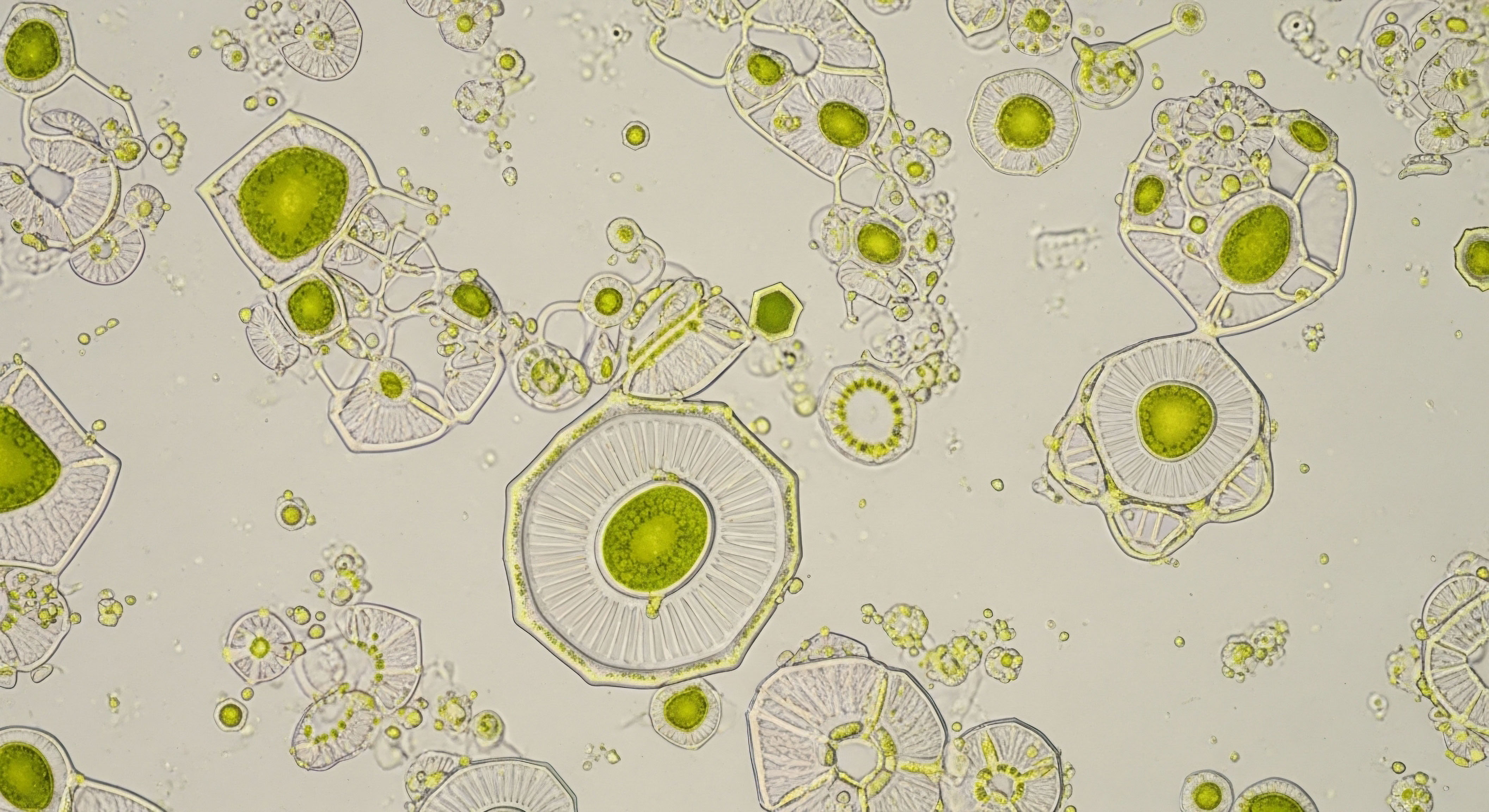

Fundamentals
That feeling of fatigue, the subtle loss of vitality, or the sense that your body is no longer responding as it once did ∞ these experiences are deeply personal, yet they are rooted in the intricate biology of our endocrine system. When we discuss hormonal health, we are speaking about the body’s internal communication network.
Testosterone, often associated primarily with male characteristics, functions as a critical signaling molecule for both men and women, profoundly influencing systems far beyond reproduction. Its role in cardiovascular health is a prime example of its systemic importance. Understanding this connection is the first step toward reclaiming your body’s intended function.
Balanced testosterone levels contribute to cardiovascular wellness by acting directly on the tissues of the heart and blood vessels. This steroid hormone helps maintain the structural integrity and function of the cardiovascular system. It influences the production of red blood cells, which are essential for oxygen transport, and it plays a part in regulating the body’s inflammatory responses.
When these foundational processes are optimized, the entire cardiovascular network operates more efficiently. The journey to wellness begins with appreciating how these microscopic actions translate into macroscopic health benefits, impacting everything from your energy levels to your long-term vitality.
Optimizing testosterone levels provides a foundation for cardiovascular resilience by supporting the very tissues that keep your heart and vessels functioning.
The relationship between testosterone and cardiovascular health is complex, with the hormone exerting its influence through multiple biological pathways. One of its key roles is in the maintenance of healthy body composition. Adequate testosterone levels support the development of lean muscle mass and discourage the accumulation of visceral fat, the type of fat that surrounds the abdominal organs and is a known contributor to cardiovascular risk.
By promoting a healthier ratio of muscle to fat, balanced testosterone levels help to improve metabolic function, which is intrinsically linked to the health of your heart and circulatory system.

How Does Testosterone Affect Blood Vessels?
Testosterone has a direct effect on the endothelium, the inner lining of your blood vessels. It promotes vasodilation, which is the widening of blood vessels. This process helps to lower blood pressure and improve blood flow, reducing the workload on the heart.
The hormone achieves this by stimulating the production of nitric oxide, a molecule that signals the smooth muscles in the vessel walls to relax. This mechanism is fundamental to maintaining cardiovascular health, as it ensures that oxygen and nutrients are delivered efficiently throughout the body while preventing the excessive strain that can lead to long-term damage.
Furthermore, testosterone’s influence extends to the cellular level within the vascular system. It can modulate the processes of inflammation and plaque formation, both of which are central to the development of atherosclerosis, or the hardening of the arteries.
While the exact mechanisms are still the subject of ongoing research, evidence suggests that optimal testosterone levels contribute to a less inflammatory environment within the blood vessels, making them less susceptible to the buildup of cholesterol-laden plaques that can restrict blood flow and lead to serious cardiovascular events.


Intermediate
For those already familiar with the foundational concepts of hormonal health, the next step is to understand the specific clinical protocols designed to restore and maintain optimal testosterone levels. These are not one-size-fits-all solutions; they are tailored therapeutic interventions based on an individual’s unique biochemistry, symptoms, and health goals.
The primary aim of these protocols is to recalibrate the endocrine system, bringing testosterone and other key hormones back into a functional, youthful range. This process of biochemical recalibration has profound implications for cardiovascular health, addressing many of the underlying factors that contribute to age-related decline in cardiac function.
Testosterone Replacement Therapy (TRT) for men is a well-established protocol for addressing the symptoms of andropause, or low testosterone. A standard approach involves weekly intramuscular injections of Testosterone Cypionate, a bioidentical form of the hormone. This is often complemented by other medications to ensure a balanced hormonal profile.
Gonadorelin, for example, is used to maintain the body’s natural production of testosterone by stimulating the pituitary gland. Anastrozole, an aromatase inhibitor, may be prescribed to prevent the conversion of testosterone into estrogen, thereby mitigating potential side effects. This multi-faceted approach ensures that the entire Hypothalamic-Pituitary-Gonadal (HPG) axis is supported, leading to more comprehensive and sustainable results.
Clinically supervised testosterone optimization protocols are designed to mimic the body’s natural hormonal rhythms, thereby maximizing therapeutic benefits while minimizing risks.
For women, particularly those in the peri-menopausal or post-menopausal stages, low-dose testosterone therapy can be a valuable tool for addressing symptoms like low libido, fatigue, and mood changes. The protocols for women are carefully calibrated to their specific needs, often involving much lower doses of Testosterone Cypionate administered subcutaneously.
Progesterone is also a key component of female hormone optimization, prescribed according to an individual’s menopausal status to ensure endometrial health and overall hormonal balance. In some cases, long-acting testosterone pellets may be used, offering a convenient alternative to weekly injections.

Comparing Male and Female TRT Protocols
The differences in TRT protocols between men and women highlight the importance of personalized medicine in hormonal health. While the underlying principle of restoring optimal hormone levels is the same, the specific dosages and adjunctive therapies are tailored to the distinct physiological needs of each sex.
| Protocol Component | Typical Male Protocol | Typical Female Protocol |
|---|---|---|
| Testosterone Cypionate Dosage | Weekly intramuscular injections (e.g. 200mg/ml) | Weekly subcutaneous injections (e.g. 10-20 units) |
| HPG Axis Support | Gonadorelin or Enclomiphene to maintain natural production | Less common, focus is on symptom relief |
| Estrogen Management | Anastrozole to block estrogen conversion | Anastrozole may be used with pellet therapy |
| Other Hormones | Focus is primarily on testosterone and estrogen | Progesterone is often included, based on menopausal status |

The Role of Peptides in Cardiovascular Health
Beyond traditional hormone replacement, peptide therapies represent a cutting-edge approach to wellness and longevity. Peptides are short chains of amino acids that act as signaling molecules in the body, much like hormones. Certain peptides, such as those that stimulate the release of growth hormone (e.g.
Sermorelin, Ipamorelin), can have indirect but significant benefits for cardiovascular health. By promoting fat loss, improving sleep quality, and enhancing tissue repair, these peptides create a physiological environment that is conducive to a healthy heart and circulatory system.
- Sermorelin/Ipamorelin ∞ These growth hormone-releasing peptides can help improve body composition, which is a key factor in cardiovascular health.
- PT-141 ∞ While primarily used for sexual health, this peptide can also have positive effects on mood and energy levels, which are indirectly linked to cardiovascular wellness.
- Pentadeca Arginate (PDA) ∞ This peptide is known for its role in tissue repair and inflammation reduction, processes that are critical for maintaining the health of blood vessels.


Academic
A sophisticated understanding of testosterone’s cardiovascular benefits requires an examination of its molecular and cellular mechanisms of action. The hormone exerts its effects through both genomic and non-genomic pathways, influencing a wide array of physiological processes that are integral to cardiovascular homeostasis.
The genomic pathway involves the binding of testosterone to androgen receptors within the cell, which then translocate to the nucleus to modulate gene expression. This process can influence the synthesis of various proteins involved in everything from lipid metabolism to inflammatory responses.
The non-genomic actions of testosterone are more rapid and are mediated by receptors on the cell surface. These pathways can trigger immediate changes in cellular function, such as the activation of signaling cascades that lead to vasodilation. The interplay between these two modes of action is what gives testosterone its broad and multifaceted influence on the cardiovascular system.
For instance, the long-term benefits of improved body composition are a result of genomic actions, while the immediate effects on blood pressure are a product of non-genomic signaling.
The dual genomic and non-genomic actions of testosterone allow it to orchestrate both immediate and long-term adaptations in the cardiovascular system.
Recent research has shed light on the intricate relationship between testosterone levels and various biomarkers of cardiovascular health. Studies have consistently shown an inverse correlation between endogenous testosterone levels and the incidence of major adverse cardiovascular events. Men with lower levels of bioavailable testosterone have been found to have higher rates of all-cause and cardiovascular mortality.
These findings underscore the importance of maintaining optimal testosterone levels for long-term cardiovascular health. While the precise causal relationships are still being elucidated, the data strongly suggest that testosterone deficiency is a significant risk factor for cardiovascular disease.

What Is the Impact of TRT on Endothelial Function?
Endothelial dysfunction is a key initiating event in the pathogenesis of atherosclerosis. It is characterized by a reduced bioavailability of nitric oxide, an impaired vasodilation response, and a pro-inflammatory, pro-thrombotic state. Testosterone has been shown to counteract these pathological changes by enhancing the expression and activity of endothelial nitric oxide synthase (eNOS), the enzyme responsible for producing nitric oxide.
This leads to improved vasodilation and blood flow, as well as a reduction in the expression of adhesion molecules that facilitate the infiltration of inflammatory cells into the vessel wall.
Furthermore, testosterone has been shown to modulate the production of various cytokines and other inflammatory mediators that are implicated in the development of atherosclerosis. By suppressing the production of pro-inflammatory cytokines like TNF-alpha and IL-6, and promoting the production of anti-inflammatory cytokines like IL-10, testosterone helps to create a more favorable, anti-atherogenic environment within the vasculature.
This is a critical aspect of its cardiovascular protective effects, as chronic inflammation is now recognized as a major driver of cardiovascular disease.

Testosterone and Metabolic Parameters
The cardiovascular benefits of testosterone are also closely linked to its effects on metabolic function. The hormone plays a crucial role in regulating glucose metabolism and insulin sensitivity. Low testosterone levels are strongly associated with an increased risk of developing type 2 diabetes, a major risk factor for cardiovascular disease. Testosterone replacement therapy has been shown to improve glycemic control and insulin sensitivity in hypogonadal men, thereby reducing their risk of both diabetes and its cardiovascular complications.
| Metabolic Parameter | Effect of Optimal Testosterone Levels | Cardiovascular Implication |
|---|---|---|
| Insulin Sensitivity | Increased | Reduced risk of type 2 diabetes and its cardiovascular complications |
| Visceral Adiposity | Decreased | Lower levels of systemic inflammation and improved metabolic profile |
| Lipid Profile | Favorable changes (e.g. lower LDL, higher HDL) | Reduced risk of atherosclerosis |
| Lean Body Mass | Increased | Improved metabolic rate and overall physical function |
The influence of testosterone on lipid metabolism is another important aspect of its cardiovascular benefits. While the findings from various studies have been somewhat inconsistent, the general consensus is that optimal testosterone levels are associated with a more favorable lipid profile, characterized by lower levels of low-density lipoprotein (LDL) cholesterol and higher levels of high-density lipoprotein (HDL) cholesterol. These changes in the lipid profile contribute to a reduced risk of atherosclerosis and other cardiovascular events.
- Genomic Pathways ∞ Testosterone’s influence on gene expression can lead to long-term structural and functional changes in the cardiovascular system.
- Non-Genomic Pathways ∞ Rapid, cell-surface receptor-mediated actions of testosterone can induce immediate effects like vasodilation.
- Metabolic Modulation ∞ By improving insulin sensitivity and lipid profiles, testosterone indirectly protects the cardiovascular system.

References
- Morgentaler, A. (2018). The Endocrine Society, the American Urological Association, and the new testosterone guidelines. Andrology, 6 (4), 503 ∞ 504.
- Saad, F. & Gooren, L. (2014). The role of testosterone in the metabolic syndrome ∞ a review. The Journal of Steroid Biochemistry and Molecular Biology, 142, 50 ∞ 54.
- Traish, A. M. (2014). Testosterone and cardiovascular disease ∞ an old idea with modern clinical implications. Current Atherosclerosis Reports, 16 (9), 435.
- Jones, T. H. (2010). Testosterone deficiency ∞ a risk factor for cardiovascular disease? Trends in Endocrinology & Metabolism, 21 (8), 496 ∞ 503.
- Mulligan, T. Frick, M. F. Zuraw, Q. C. Stemhagen, A. & McWhirter, C. (2006). Prevalence of hypogonadism in males aged at least 45 years ∞ the HIM study. International Journal of Clinical Practice, 60 (7), 762 ∞ 769.

Reflection

What Does This Mean for Your Personal Health Journey?
The information presented here provides a map of the intricate biological landscape connecting testosterone to cardiovascular health. It is a map drawn from decades of clinical research and scientific inquiry. Yet, a map is only a guide. The territory it represents ∞ your own body, your unique physiology, your personal experience of well-being ∞ is something only you can navigate.
The knowledge you have gained is a powerful tool, a compass to help you ask more informed questions and make more empowered decisions about your health.
This exploration into the science of hormonal optimization is the beginning of a conversation. It is a conversation with yourself, about how you feel and how you want to feel. It is also a conversation to be had with a qualified clinical professional who can help you interpret your own biological signals and guide you on a path toward reclaimed vitality.
The journey to optimal health is a personal one, but it is not one you have to take alone. The potential for a more vibrant, functional, and resilient life is within you, waiting to be unlocked.



